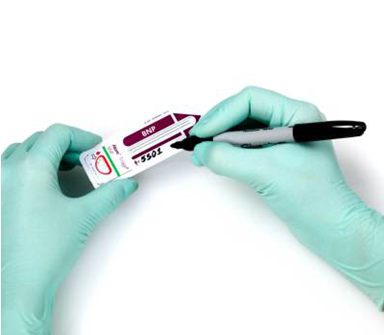 A Brain Natriuretic Peptide (BNP) test is a blood test that can help your doctor decide whether your symptoms are caused by heart failure or by something else. BNP is a substance released from a ventricle (lower pumping chamber) of the heart when the ventricle is stretched too much. This stretching can happen from volume overload, such as with heart failure. BNP is released during heart failure, signaling the kidneys to make more urine. This helps to decrease the extra volume in the blood vessels and heart.
A Brain Natriuretic Peptide (BNP) test is a blood test that can help your doctor decide whether your symptoms are caused by heart failure or by something else. BNP is a substance released from a ventricle (lower pumping chamber) of the heart when the ventricle is stretched too much. This stretching can happen from volume overload, such as with heart failure. BNP is released during heart failure, signaling the kidneys to make more urine. This helps to decrease the extra volume in the blood vessels and heart.
What’s the Normal Range of BNP Test?
A reading of 0-99 pg/mL is considered normal.
Any reading from 100 - 900 pg/mL is considered abnormal and can indicate heart failure at varying levels of severity. You may use the following reference to interpret the readings:
100-300 pg/mL is an indication of a potential heart failure.
300 pg/mL or higher is an indication of mild heart failure.
600 pg/mL or higher is an indication of moderate heart failure.
900 pg/mL or higher is critical and is considered as severe heart failure.
Why it’s Done?
Doctors prescribe a BNP and NT-proBNP test when they want to identify a potential heart failure, assess the severity of an existing failure, or to measure the response to a heart failure related treatment.
Patients with edema and symptoms such as shortness of breath, difficulty in breathing, and fatigue are put through the BNP test along with an echocardiogram. This helps a doctor to identify if the symptoms are related to a heart failure or lung disease, helping them derive the next course of action.
There is some amount of preparation that is required before appearing for a BNP test. For the results to be accurate, you are required not to eat any food or drink anything but water for the preceding 8 to 12 hours. A blood sample is collected from the veins to conduct the tests.
The amount of BNP in your blood is measured as pg/mL or 'picograms per milliliter'.

Advanced Facility Helps Make Exact Diagnosis. View More >>